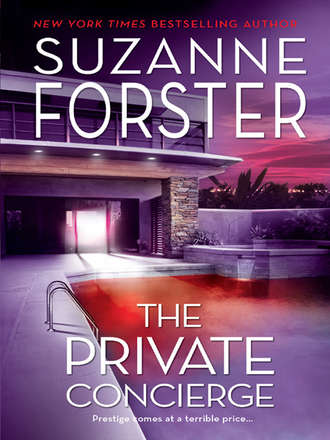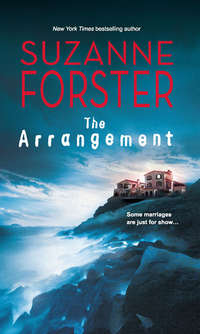
Полная версия
The Private Concierge
She opened the drawer of her desk and pulled out Ned’s application. She hadn’t given it to anyone yet to process, and she’d handled the credit-card transaction herself. Her receptionist and assistant, Mary, had been out on a break, and Lane had been watching the desk. So, no one knew about Ned Talbert but her. And no one could know.
4
Rick prowled the darkened house using only a penlight. He wore latex gloves and slipcovers over his shoes the way evidence technicians did to avoid contamination. He was familiar enough with the place to find his way around in the dark, but didn’t want to chance disturbing the crime scene evidence and signaling that someone had been here.
Not that anyone would notice, he suspected. It was just after midnight, and the guard had changed. The rookie had been replaced by a retiree. Sound asleep in a chair by the house’s front entrance, the night-shift guy was doing a good imitation of a rusty buzz saw.
Rick had parked on a side street, walked over and let himself in through the back way, using a customized attachment on his pocketknife to jimmy the lock, rather than touch the knob, which should have been dusted for prints but didn’t appear to have been. He was here to check out the crime scene, but he was also looking for the package he’d passed off to Ned all those years ago for safekeeping. And maybe the darkness would help him focus on his mission, instead of the countless reminders of his friend.
He’d identified the body at the morgue today. It was Ned without question. Rick saw the faded scar on his friend’s chin even before he saw the bullet hole. When they were kids, he and Ned had believed they could do anything—jump off roofs and fly, walk on water—and they had the scars to prove it. Nothing daunted them, even when Ned missed a branch playing Tarzan, fell to the earth and split open his chin. They’d been eight at the time.
Rick turned off the light and stopped, needing a moment to deal with all of it, to breathe against the suffocating weight in his chest. He’d gone numb after his visit to the morgue, and he wished to hell he could stay that way. Scarred or not, the face he’d seen on the concrete slab wasn’t his friend. It was a death mask with Ned’s features. The body that had housed his larger-than-life spirit was an empty shell. He was gone.
Rick didn’t believe in heaven and hell. He couldn’t console himself with the belief that he would ever see his friend again. The Ned who’d been like a part of him had vanished, leaving Rick feeling as empty as the body in the morgue. He couldn’t even hold a clear picture of Ned in his mind without having it replaced by a corpse with a bullet through its brain. There was no comfort to be found, even in his memories. That was why he had to find out what had happened. At least then he wouldn’t be haunted by questions.
When he left the morgue, he’d driven straight over to the West L.A. station to talk with his buddy, Don Cooper, in homicide, who wasn’t on the case but had confirmed that it was being handled by the big guns of the elite Robbery Homicide Division. Coop had heard unofficially that Ned’s celebrity status in the sports world warranted the high-level involvement, not because they believed it was anything other than a murder-suicide. Coop also confirmed that a suicide note had been found at the scene, but the contents had not been revealed.
And then, for some reason, he’d volunteered the kind of gun Ned had used. None of this information should have been shared with an outsider, which was why Rick had come to Coop. He was a talker. One of these days Coop was going to talk himself right out of a job, Rick imagined.
Rick beamed the light over the leather chair where Ned had been sitting when he pressed the barrel of a full-size 9 mm Glock to his right temple and pulled the trigger. The chalked outline showed him knocked to the left by the force of the discharge and slumped over the arm of the chair.
Jesus, what had made him do that?
Rick’s head swam with questions that were almost unbearable. Did Ned get that idea from him? Had the scene at the cabin triggered something in his friend? They’d done everything together as kids, and Rick had almost always been the leader, the instigator.
But Rick couldn’t let himself believe that, despite the lacerating guilt he felt. Ned was an adult, his own man. He wouldn’t have copycatted a suicide. Rick needed to start thinking like an investigator. What was Ned doing with a Glock? He didn’t own a gun and had no use for them. He’d always said he could do more damage with a baseball bat. Rick wondered if anyone had checked to see if Ned had bought a gun recently or had a permit to carry the gun that was used. Or dusted the empty shell casings for prints.
Rick flashed the beam from the chalked outline of Ned’s body to the woman’s on the floor at the foot of his chair. According to Coop, she’d died in a sexually degrading position while partially naked and restrained. The cause of death was suffocation. She’d had a cheap grocery-store plastic bag tied around her head.
Rick had asked Coop if burn marks were found on her genitals. He’d looked at Rick funny but hadn’t asked any questions. He’d said he didn’t know, but she probably hadn’t died quickly. The condition of the plastic bag, plus the way the vessels in her eyes had hemorrhaged indicated the suffocation might have been interrupted several times, perhaps intentionally.
Rick breathed a curse word. This was all wrong. He knew it to the depths of his being. This wasn’t a hero’s death. Suffocating a bound woman and then shooting yourself was cowardly. Ned wouldn’t have wanted to go out this way, or take her with him. He was trying to save Holly, not kill her.
Ned was drawn to self-destructive women, probably because of his mother. Her heroin habit had driven her to extremes, including hooking to get money for drugs. She’d died of an overdose when Ned was really young, and like a lot of kids with parents who screw up, he’d felt responsible. He’d been picking questionable women ever since, maybe thinking he could fix whatever was wrong. Or maybe they’d picked him. Nice guys like Ned were easy targets.
Rick looked from one chalked form to the other, trying to get a sense of the dominant emotion involved. Every crime scene had clues; the trick was to read them correctly. Murder was usually driven by fear or rage, but he didn’t pick up either here. There was a methodical feel to these crimes—and that wasn’t Ned. He’d said he was being blackmailed because of his sex practices, but he’d also said it was all lies. This crime scene said he was the liar. Only blind rage could have driven him to this. And why take his rage out on Holly? Unless he was being blackmailed by her.
Rick had no answers as he slowly flashed the beam around the rest of the room. The blood and spatter patterns were typical of self-inflicted gunshot wounds, and according to Coop, there’d been no sign of forced entry. Rick saw nothing else that stood out, and with every passing second the risk of being discovered increased. But there was one last thing that had to be done.
He moved silently to the hallway that led to the master bedroom. He passed a writing desk on the way, and the beam of his penlight struck something small and shiny. The desk drawer was partially open and a high-gloss business card was stuck in the sliding mechanism on the side. Rick could imagine a technician opening the drawer and finding the card, along with other things to be bagged as evidence, then unknowingly dropping the card while closing the drawer. Or it might have been something else entirely. Someone may have been in a great hurry to cover his tracks and grabbed for the card but dropped it. The killer perhaps?
Rick fished the card out and held it under the light. The initials TPC were elegantly scrolled down the left side in gold leaf. Laddered across the card just as elegantly were the words The Private Concierge. On the bottom right was a woman’s name, a phone number and an e-mail address. Lane Chandler.
The name was familiar, but Rick couldn’t place it. He turned the card over and found a one-word question scrawled in what looked like Ned’s handwriting: Extortion?
Was Ned accusing The Private Concierge of extortion or had he been looking for a surface to write on, grabbed the card and then tossed it in the desk drawer without realizing it had fallen down the side? And why hadn’t homicide or the crime scene guys noticed it? Rick had spotted it in the dark.
Rick was running out of time. He continued down the hall to the bedroom and went straight to the maple armoire. The largest drawer had a secret compartment with a safe in the back, but Rick found it unlocked—and empty. Either Ned had moved the package, which he wouldn’t have done without telling Rick, or the police had found it and taken it as evidence. And Rick couldn’t avoid the other possibility—that certain people still had a vested interest in the contents of the package, and one of them had been here. But if that was the case, what connection did it have to last night’s carnage?
Rick heard a scraping sound, metal chair legs against concrete. The officer was awake, maybe shifting position or getting up. He checked his pocket to make sure the business card was there, clicked off the penlight and headed for the back door. He’d watched Ned put the package in the compartment, but it was gone. And he couldn’t risk taking any more time to search for it.
Monday, October 7
Two days earlier
Lane Chandler? Rick stared hard at the business card, aware that his eyes were tired and stinging. He rubbed them, massaging the sockets with his thumbs to relieve the pressure. It was six in the morning, and he’d been up and down all night. His mind wouldn’t let him sleep for any length of time. There were too many questions, and primary among them was why her name had struck a chord.
He wasn’t familiar with the concierge service, and he didn’t know anyone named Lane Chandler, personally or otherwise. He’d heard the name somewhere, but he was exhausted and emotionally spent. He just couldn’t seem to place it. He thought back, mentally sorting through the names of his clients over the years. He could check the actual files, but something kept him stuck in the chair in his cubbyhole of a home office, playing alphabet games. It didn’t sound real. Who had a name like Lane Chandler? A movie star, maybe.
L.C. What other women’s name began with L? Not that many: Linda, Lydia, Lilly, Laurie, Leigh, Lucille, Lucy. Lucy?
Oh, Jesus. He rocked up from the chair and left it teetering. He didn’t know any women, but he knew a girl named Lane Chandler. Or had known one. He’d arrested the little brat fifteen years ago. She’d assumed the name of a B-movie star when she ran away from home. She’d told Rick’s partner, Mimi, that she’d picked some bit player from the old celluloid westerns with the stage name Lane Chandler. She liked the name, but not because the initials were L.C. That had been a coincidence. Taking on a man’s name had made her feel stronger and tougher, like she could handle herself on the mean streets of L.A.
And then what had she done but trash herself on those streets?
Rick paced the room, feeling like he was in a cage, but maybe he needed the confinement right now. Where would he go if he wasn’t hemmed in by these L-shaped walls? He might head south and never stop. South to the border. Run, don’t walk. Go, Rick, go. Get the holy hell out of here. Have some semblance of a life while you can. Meet a woman, fall in love for ten minutes. Give your heart away. It’s the only thing you have left of any worth.
Lane Chandler.
He slowed up and let his thoughts roll back a decade and a half. She was Lucy Cox. What a dangerously precocious kid that one had been, a real handful, the Jodi Foster of her time. Rick had picked her up for street prostitution—an open-and-shut case, given that she’d propositioned him. Blue-eyed and bold, she’d actually made him wish she was fifteen years older—and that had never happened before.
He’d been working juvenile vice since he’d signed on with the force, and dealing with drugged-out street urchins was enough to make any normal man want to put them in a straitjacket so they couldn’t hurt themselves or someone else. They were sad, angry and desperate. Too often they ended up dead. But she wasn’t one of them. She was something else, an underage madonna, luminous enough to light up skid row. The courts had put her in juvie, and Rick had helped make sure she didn’t get out until she was legal, eighteen.
Rick walked to the window and stood there, shirtless, in the rising beam of light, letting it warm him. Jeans were all he’d bothered with this morning. There wasn’t a woman around to complain about his bare chest—or appreciate it, for that matter. Hadn’t been for quite a while. His last long-term relationship, and only marriage, ended ten years ago, for the same reason most law enforcement marriages ended. Criminal neglect. It wasn’t that he didn’t love her. He just didn’t have the time or energy to love her the way she needed it. Couldn’t blame her for that. He shouldn’t have married in the first place, but he’d been young—and probably just selfish enough to want someone around on those interminable nights of soul-searching, someone to ease the loneliness.
The slam of a neighboring door brought his attention back to the view. His cubby was a converted storage room, and its only window looked out on the alley behind his house, exposing the back sides of a half block of badly weathered beach houses. The alley had little to recommend it, except bower after bower of glorious red and orange bougainvillea. Rick loved the stuff. It festooned the courtyard out front, too, and as far as he was concerned, it made his beach cottage look like a small palazzo.
Lane Chandler. God, he didn’t want to go back there. It wasn’t going to help anyone to dredge up that muck, least of all Ned. And there were so many other reasons not to pursue this investigation. A case like this could take months, years, even for a seasoned homicide detective, which Rick wasn’t. You needed the right resources, computer databases, labs and technicians to investigate a murder. He had access to none of that, and he was running out of time. Everything pointed to murder-suicide. The police had already written it off.
But foremost among the reasons to let this investigation go was her, Lucy Cox, all grown up and running her own concierge service. Why didn’t that surprise him?
He walked back to his desk, swept up her card, crushed it in his fist and dropped it in the trash. And then he left the room.
He got as far as the living room, as far as the doors to his beloved courtyard, before a realization stopped him. Like a bomb it hit him. What were the odds of so many seemingly disparate things converging on that one night at Ned’s place? Rick had found Ned and his girlfriend dead, the package missing and Lane Chandler’s card stuck to Ned’s desk, all within the same time frame. Or what appeared to be the same time frame. The package could have been missing awhile, but Rick didn’t think so. Ned would have mentioned it. And Rick suspected the card was recent, too. Ned wouldn’t have let that slip, either. But maybe that was what Ned had been trying to say the night he showed up at the cabin.
What Ned didn’t know, what no one knew except Rick, was that Lucy Cox was connected to that missing package. She was the catalyst for what had happened fifteen years ago—and the reason Rick had left the force.
If she really was Lane Chandler now, Rick questioned whether it was a coincidence that Ned had come across her somewhere. Had she approached him because she wanted the package herself? Why? He could think of people who might want to get their hands on it, but why her? Blackmail, most likely. And how did she know that Ned had it?
He turned and slammed back through the house, swearing to himself. He nearly took the door off the hinges as he entered his office, and the first thing he did was pick up the trash can. Now, where the hell was that card?
5
Priscilla Brandt hesitated at the bottom of the grand stairway and visually swept her living room with the acuity of a young, hungry bird of prey, missing nothing. The house was perfection, even to her critical eye. Fresh-cut irises stood in tall crystal vases, satin pillows were plumped and the Brazilian-cherry floors gleamed. Just the faintest whiff of lavender oil pleasantly stimulated her senses, along with the rippling piano runs of Mozart’s Adagio in H Minor.
If you want your guests to think well of you, treat them well. If you want them forever in your debt, spoil them rotten and send them home with expensive gifts. If you have no money, cook exquisitely.
It was one of the many bits of wisdom in her sassy new etiquette book, currently at the top of the New York Times nonfiction list. Quite the coup for a former hash-slinger from the San Fernando Valley. Of course, the hash-slinging was how she’d put herself through college, but still, she had no real pedigree like the other mavens of manners, and at twenty-six she was a mere upstart compared to icons like Emily Post and Amy Vanderbilt.
Lineage matters only if you have nothing else of interest to offer.
She plucked an imaginary speck from the sleeve of her cashmere twinset and walked to the mirror over the fireplace to check her long chestnut waves for fullness and vitality, all signs of a healthy female libido, which was crucial in today’s market, no matter what you were selling. She couldn’t very well be outwardly sexy in her profession. She had to leave that impression in other ways, such as the slim, side-slit skirt and the snug fit of her sweater set, all belying the propriety of her cultured pearls. This was a lady, yes, but a tramp, as well, to anyone lucky enough to know her that well.
Feminine wiles are all about promise, ladies. Delivery is an altogether different matter.
Another of Priscilla’s pointers. And within the hour she would be sharing more of her advice on national television. Another coup for the poor relation. The TV crew would be here soon to set up in the garden where she would be having tea with none other than national morning-show anchor Leanne Sanders, and Priscilla had made sure the grounds of her leased home in the Santa Monica hills were as perfect as the interior.
The trick was to be perfect without being perfectly boring. She had to be just witty enough, just tarty enough, to catch and hold the interest of a fickle public. But with impeccable manners, of course.
For Priscilla the payoff was more than book sales. She was in discussions for her own afternoon talk show, and it was with the very network about to interview her. So far the only stumbling block was the snot-nosed executive producer, who couldn’t have been more than twelve, if his acne was any indication. Right in front of the network brass, he’d said he just wasn’t “feeling” an etiquette show in the era of shock jocks and reality TV. Her material wouldn’t be edgy or opinionated enough. The only thing he hadn’t done was yawn. Pris would have had a breath mint ready to cram down his throat if he did.
She walked to the living room windows, pride swelling as she anticipated the beauty of the wisteria-covered arbor. The smile died on her red-matte lips as she looked out. “What the fuck?”
The crazy squatter was back and he’d turned her beautiful garden into a tent city! His crude cardboard shelter blighted the wisteria arbor where she’d created the perfect English garden for her outdoor tea. He’d been sneaking onto her property for weeks now, and she’d made the mistake of giving him money to get rid of him. Well, no more payola. She was going to kick his grungy butt off the property herself, not that she had much choice. She didn’t trust the hired help not to rat her out to the tabloids.
She grabbed her cell phone from the writing desk in the hall and marched to the front door at a military clip. Someone had been giving the tabloids information about her, and she was going to put a stop to that, too. The rags had labeled her Ms. Pris, but now they were questioning whether it should have been Ms. Hissy Fit, simply because she’d taught a reckless teenage tailgater a lesson by letting him pile into the back of her new Mercedes. She’d publicly assailed him for riding her ass all the way to Burbank, and a gathering crowd had cheered her on, which seemed vindication enough. But there’d been no applause the following week when she’d made a waitress cry for serving cold food.
Okay, Ms. Pris had a temper. She was working on it. But this squatter was different, a clear violation of her rights. The porous greenbelt that ran from the house’s car park to the garden forced her to walk on the tiptoes of her shoes to keep the high heels from sinking in. When she was done with this guy, she would go change into flats and freshen up again. She had time, twenty minutes—and she had another tip for her next book. Never wear high heels at lawn parties!
As she neared the cardboard tent, she saw a pair of grubby bare feet poking out the bottom and a pile of beer cans and trash next to them. She also saw something that made her blood boil. He’d been using her beautiful lawn for a toilet.
Another F-bomb rolled off her tongue. “Pack up your things and get out of here,” she demanded.
He didn’t respond and she kicked at the refrigerator box with the pointed toe of her heels. “Did you hear me?”
The box lifted off him and as the man roused and rolled toward her, Priscilla saw that he wasn’t the transient she’d been paying off. He was much younger and fitter, with bright blue eyes shining through his shaggy brown hair—and he might not be so easily handled.
“This is private property.” She brandished the cell phone. “You have two minutes to get your things and leave, or I’ll call 911.”
“Fuck off,” he muttered, grabbing the box and giving it a shake, as if she’d soiled it. He turned his back to her and collapsed under his cardboard canopy, apparently intending to sleep off the rest of what was probably a liquid breakfast.
Somewhere in the base of Priscilla’s brain, two wires touched, white hot. A circuit shorted out, sparks erupted and she began to tremble. There was no chance to curb the impulse. It was swift and lethal, animal rage. Her fists clenched, and her upper lip curled back, baring small, sharp incisors. Delicate nostrils flared, and a snarl rattled in her throat, as savage as anything heard in the jungle.
How dare he turn his mangy freeloading back on her! Counting to ten wasn’t an option when some asshole was about to destroy the opportunity of a lifetime. Her lifetime. She dropped the phone and picked up a sculpture of an iron crane from the garden bed, her only thought to wale on this guy. She didn’t even care if the crew arrived and saw her. He needed to be taught a lesson.
That snot-nose executive producer wanted edgy? Ha!
But as she raised the sculpture over her head like a club, a tiny voice of sanity—or maybe it was opportunity—intruded. There might still be some way to salvage this. If she could hit him just hard enough to knock him out, she could roll him onto the cardboard box and drag him out of here, an Indian carry. That way he couldn’t fight her.
The horrible crunch of iron against skull bone made her wince, and just as quickly as rage had flared, it was gone. Fear flooded her, dropping her to her knees. Whenever she had these insane episodes, she was devastated afterward, shaken, afraid and deeply humiliated at what she’d done. This had to be her worst outburst ever. Had she killed him?
She pulled off the cardboard to find him slumped and unresponsive but still breathing. He was out cold. If she could get him onto the cardboard, she might still be able to drag him into the bushes where he couldn’t be seen, but she had so little time left.
Moments later, bent over him and struggling to catch her breath, she realized it was no use. She couldn’t even roll him over. He weighed as much as ten men. She sank onto the ground next to him, sobbing and furious. She should have killed him. Look at what he’d reduced her to.





